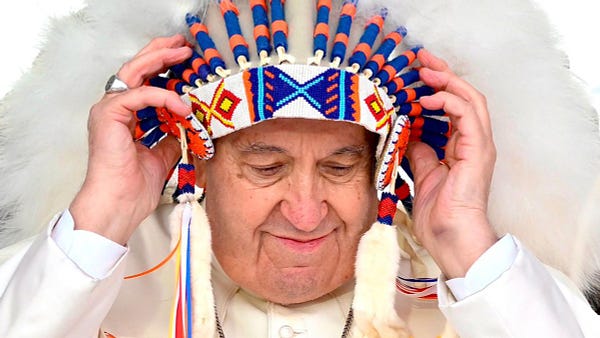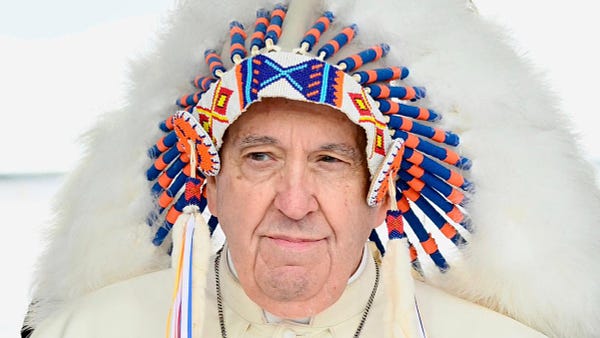Hey everybody,
I’m on vacation, and you’re reading The Tuesday Pillar Post.
I’ll tell you more about my vacation in just a bit. First, here’s the news:
The news
This is not the very model of a modern papal pilgrimage — Francis is not focused on meeting with heads of state, or celebrating stadia Masses. There will be some of that. But most of the trip is focused on meeting with the leaders of Indigenous Canadian communities, to whom the pontiff has expressed contrition for the Church’s complicity in the residential school system, by which Canadian government policies forcibly separated Indigenous kids from their families, and stripped them - often - of their language and culture.
For more detail on what this papal trip’s all about, Michelle La Rosa put together an explainer for you on what’s already happened, and what’s still scheduled. Give it a read.




Of course, the symbolism of the papal trip is self-evident, and has made headlines on a global stage.
But behind the symbolism of a papal trip is a lot of detailed logistic planning and preparation, even just to give the pontiff a few minutes of down time before his major events.
Pope Francis’ first official meeting Monday was with Indigenous leaders in Maskwacis, Alberta, the site of the Ermineskin Residential School, which closed in 1975.
How do you prep for a papal pit-stop? We talked with Fr. Roger Rouleau to find out. And I think you’ll probably find this all pretty interesting.
—
Pope Francis told Indigenous leaders Monday that he had come to Canada “because the first step of my penitential pilgrimage among you is that of again asking forgiveness, of telling you once more that I am deeply sorry.”
Ed broke down this morning why the papal apology, and indeed the entire Canada trip, “seems geared more towards a fuller, Christian idea of reconciliation” than on “closing the book on what happened in the past.”
Analysis worth reading, right here.
—
This Pillar Post is brought to you by Harmel Academy, a post-secondary Catholic trade school that trains men in a high-demand, skilled trade, forms them spiritually in a community of prayer and service, and mentors them intellectually through a robust, integrated humanities curriculum. We are now accepting applications for Fall 2022 and for Fall 2023!
After the Supreme Court’s Dobbs decision overturned Roe v. Wade, it became trendy for companies to announce that they’d pay for employees to travel to abortion-permissive states for abortions if needed — this was framed as a gesture of solidarity with women.
Of course, not everyone saw this as an act of corporate responsibility. And Bishop Thomas Paprocki of Springfield, Illinois opined last week that business leaders announcing policies like that should not be approaching the Holy Eucharist — at least not before repenting of their cooperation in abortion.
We found that announcement pretty interesting — a shift from the focus on politicians in our “Eucharistic coherence” conversation, to consider who else bears some responsibility for aiding or enabling abortions.
Ed also asked Bishop Paprocki about issues beyond abortion — about corporate leaders aiding in pornography, arms production, or the unjust use of the death penalty. And the bishop had some interesting ideas on that front.
This is a good interview — a nuanced conversation and some original thinking. You oughta read it.
Luke Coppen covered last week the fascinating story of a heated liturgy war among Syro-Malabar Catholics in India, and in India’s diaspora around the world. If you haven’t yet, you should read his original coverage of the divide — you won’t find reporting like this anywhere.
Well, there’s been a development. Inthe Archdiocese of Ernakulam-Angamaly - the epicenter of the liturgical conflict - a group of priests has accused India's apostolic nuncio of trying to remove from office Archbishop Antony Kariyil, a major player in the Syro-Malabar disagreement.
Kariyil is not the archbishop of Ernakulam-Angamaly. He’s a Vatican-confirmed “archepiscopal vicar” — a kind of super-empowered vicar general, placed in archdiocesan governance while Cardinal George Alencherry, the diocesan bishop and leader of Syro-Malabar Church, has faced some legal troubles in India.
Kariyil is also seen as the bishop who has protected Syro-Malabar priests from making a set of liturgical changes they seriously oppose. In the middle of this fight are questions about Roman intervention into the affairs of sui iuris Eastern Catholic Church, and a lot of disagreement about who should be leading the 4 million Catholics of the Syro-Malabar Church.
An appeals court in Vatican City upheld last week the corruption and embezzlement conviction of Angelo Caloia, who was for 20 years director of a Vatican bank - the Institute for Works of Religion. The one-time Vatican banker, who is 81 years old, has been sentenced to eight years in prison.
What did Caloia do? Well, he sold off pieces of the IOR’s investment portfolio to himself and his lawyer, using a bunch of offshore holding companies to make it happen. And now he’s going to prison.
If you’re following the current criminal case against Cardinal Angelo Becciu and nine other defendants in a Vatican City courtroom, the Caloia case involves some familiar characters - namely prosecutor Alessandro Diddi and judge Giuseppe Pignatone. And those two guys have just worked together to send an octogenarian to prison for eight years. If that’s indication of anything, it’s that - should the current case end in convictions - those two will be unlikely satisfied with slaps on the wrist.
Becciu and company should be nervous to see Caloia actually don a prison jumpsuit, given what it could mean for their own fates at the conclusion of the ongoing criminal trial.
Finally, you may have read news reports this week about medical students at the University of Michigan, who walked out on the “white coat ceremony” which symbolizes their matriculation into the medical community of practitioners.
They walked out because one of their professors, Kristin Collier, was chosen by the university to give the keynote address, and Collier is pro-life. Students and alumni had protested and petitioned for weeks against Collier’s role in the ceremony, although she wasn’t actually planning to address abortion in her speech.
Still, students and alums, (to say nothing of activists and pundits) found Collier’s presence offensive, in part because of the views she offered in a June interview with The Pillar.
That’s right — we really ticked off the University of Michigan. Oh well. I can live with that.
Collier’s interview, though, is worth reading — she’s a really interesting person, with a cool conversion story, doing some important work on the relationship between health, spirituality, and religion:
Regarding the question of whether faculty should share their faith beliefs with learners, this is also an arena that can be considered controversial. Again, there is a power differential between a learner and a faculty member. But in the right context, a sharing of one’s most deeply held commitments can be not only appropriate but beneficial for both parties. We recently held a debate at my institution on this topic where I debated a fellow colleague on this very question.
We are a public medical school yes, and we can’t espouse formally one value set over another as an institution, but at an individual level, we should rely on our faculty to share their ways of making sense of what they see in medicine, in order for the students to better understand their own sense of the world. I would argue that it is helpful for students to hear how various people live out their value system within medicine as they are trying to make sense of things.
Many faculty have a value system embedded within a spiritual philosophy or a religious tradition. Yes, they will be interacting with others who may have a different world view or value system. That’s OK! Those commitments form the very basis of who they are. Your identity is not the opposite of your openness to others, but the basis for any possibility for it.
If you’ve not read it, read the whole interview.
And if you think journalism important enough to prompt a walkout is worth supporting, well, we do too. So today’s the day to subscribe, or to give a gift subscription to a friend, pastor, or your favorite medical student.
I didn’t write anything clever or insightful
As I mentioned at the top of the newsletter, I’m on vacation this week.
On Friday we left Denver for a three-day road trip that involved a great kids’ water park, a mini Legoland play center in America’s heartland, some Kansas City barbecue, and a very good milkshake.
Yesterday I swam in a lake, hit some water slides, read half a novel, built a Lego ship with my son, and ate a steak.
But since I haven’t written anything clever or insightful for you this week, I’ll share some vacation pictures instead. I’m that kind of dad, I guess.
Later this week I’ll edit some very important reporting coming to us from Latin America and Ukraine.
But for now, I’m off to visit a sunflower maze. Possibly the world’s largest? Are there more than one — I really didn’t know this was a thing.
Thanks for subscribing to The Pillar. Please be assured of our prayers, and please pray for us — we need it!
Yours in Christ,
JD Flynn
editor-in-chief
The Pillar









